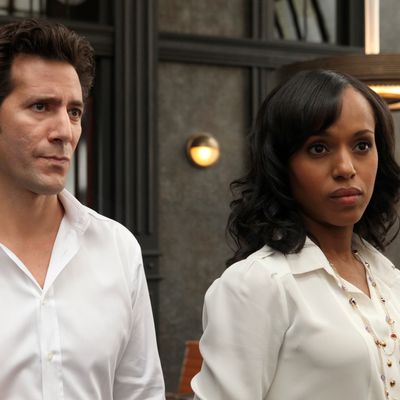
Warning: The following review of Scandal, which debuted last night on ABC, contains pretty much nothing but spoilers.
How crazy is Scandal? So crazy that I didnÔÇÖt want to review it in advance because the thought of treading lightly around its deliriously stupid/brilliant plot twists was depressing. You donÔÇÖt watch a show like this because itÔÇÖs a delicately imagined drama whose ins-and-outs need to be protected; you watch it because itÔÇÖs so enthusiastically crappy that it circles ÔÇÿround the bend and somehow becomes audacious. ItÔÇÖs the new Revenge, but so much goofier and more shameless that it makes Revenge look comparatively measured.
Created by Shonda Rhimes (GrayÔÇÖs Anatomy), this drama about a high-powered Washington PR wiz named Olivia Pope (Kerry Washington) is mainly concerned with topping itself from scene to scene. ItÔÇÖs a singularly loopy watercooler series, the kind that makes you sort of half-skip toward whoever you know is watching it and blurt out, ÔÇ£Oh my God, seriously? Did you see that? What was better? The scene where we find out the war hero Marine and right-wing icon wrongly accused of killing his wife has an alibi but doesnÔÇÖt want to use it because then the world would know he was secretly gay, or the scene where Olivia realizes the president really is having an affair because he calls the girl the same pet name that he used to call Olivia?ÔÇØ
The showÔÇÖs distinctively Rhimesian dialogue┬áÔÇö which packs two hoursÔÇÖ worth of exposition-laden dialogue into a one-hour time slot by HavingEverybodyDeliverTheirLinesSuperSuperSuperFastLikeAnAuctioneerSOLD!!!! and talk over each other constantly ÔÇö prompted the New York TimesÔÇÖ TV critic to spend a few hundred words comparing it to The West Wing, which, trust me, the show absolutely, positively isnÔÇÖt trying to be.
What itÔÇÖs trying to be is more of an unholy fusion of House of Lies and 24, only built around a team of problem-solvers (ÔÇ£Gladiators in suits,ÔÇØ one character insists on calling them, for no good reason). I donÔÇÖt really know what they do, honestly. That opening scene wherein audience surrogate/heroine Quinn Perkins (Katie Lowes) gets sneakily interviewed by one of OliviaÔÇÖs employees, Columbus Short (Harrison Wright), makes it sound as though sheÔÇÖs being recruited to be a part of the CSI team, or maybe the Avengers. They donÔÇÖt have an office, they have headquarters. They work together in one of those high-ceilinged rooms with cool lighting fixtures that CBSÔÇÖs various, mostly indistinguishable procedurals always seem to be set in. ThereÔÇÖs even a wall-oÔÇÖ-windows that looks on first glance rather like a gigantic vertical light table.
The right-wing poster-boy Marine stumbles into the office to ask for their help in his defense against the murder charge, as if theyÔÇÖre a team of Mike Hammers whoÔÇÖve hung out their shingle in a seedy two-room office above a dive bar. There really needs to be a buzzing neon sign outside OliviaÔÇÖs office window with one of the letters missing, and a corny voice-over narration by Olivia. (ÔÇ£He threw me a look, and I caught it my hip pocket.ÔÇØ) That and an invisible jet plane on the roof with vertical takeoff and landing capability: How else can you explain OliviaÔÇÖs ability to get to wherever she needs to be within, it seems, minutes of needing to be there? Kerry WashingtonÔÇÖs a type-A icon, a poster gal for borderline-OCD people who are happiest barking out orders to underlings. I donÔÇÖt know which I like better, her I-can-burn-holes-in-your-forehead stare or her amazing ability to run in four-inch heels as if sheÔÇÖs dancing barefoot through a field of daisies. The magnetically handsome yet still faintly Boris Karloffian Tony Goldwyn is perfectly cast as OliviaÔÇÖs ex-paramour, the Chief Executive. Who can make this super-achieving woman feel like a jilted middle schooler again? Only the most powerful man in the world.
If you thought the premiere was off-the-charts silly, wait till you see next weekÔÇÖs episode, which establishes beyond a doubt that this isnÔÇÖt just a case-of-the-week show, but an adventure in nuttiness, a dark-night-of-the-soul melodrama written and paced like a David E. Kelley wacky lawyer series. In its heart, itÔÇÖs about a seemingly super-controlled character, Olivia, whose every move is secretly dictated by her need to conquer private traumas. IÔÇÖm tempted to argue that OliviaÔÇÖs entire world, including its assorted supporting players, are mere projections of OliviaÔÇÖs personality. It would certainly explain why none of them seem to have personalities; if they werenÔÇÖt of different ages, nationalities, and ethnicities, it would be difficult to tell them apart, at least until they start revealing that they have personal problems, such as the Henry Ian Cusick characterÔÇÖs inability to commit to the woman he wants to marry, a subplot that gives Olivia a chance to do that ÔÇ£I know you better than you know yourselfÔÇØ thing that certain powerful people do because they like to feel wizardly.
But to intuit some sort of pop-Freudian world-projection thing would be to give the series too much credit for aesthetic daring. Its not another American Horror Story (though wow, wouldnt it be awesome if it were?). Its a Shonda Rhimes show, but bulked up. Its got a preadolescents sense of storytelling momentum; every scene is leading to the next and then   revelation. And then it turns out the war hero Marine and right-wing poster boy is secretly having sex with men! And then we find out Olivia didnt just used to run the presidents campaign, she used to be the presidents girlfriend! And shes still in love with him! And then   Its the TV show as bag of potato chips. Betcha cant eat just one.


